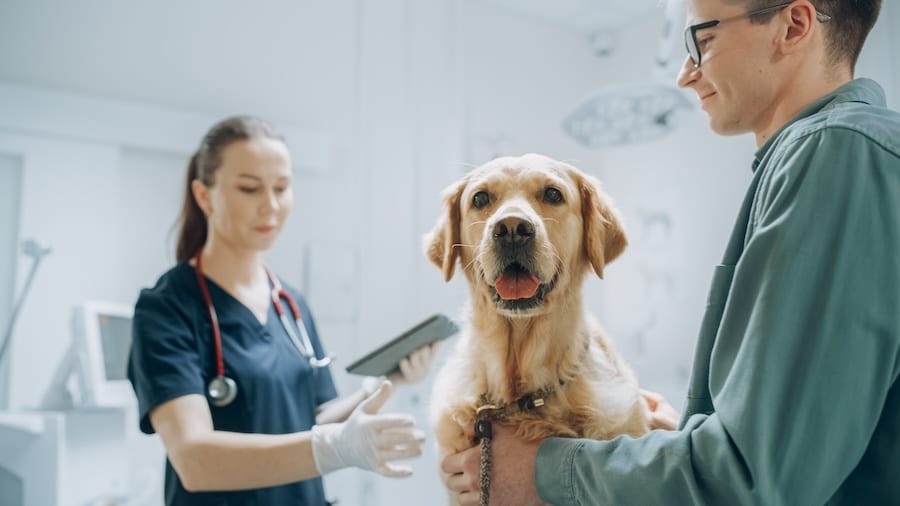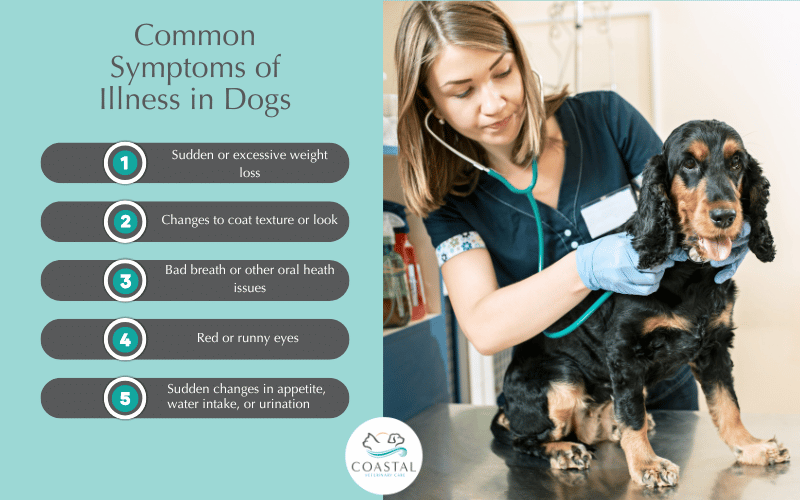Knowing if your dog is sick is crucial when being a responsible pet owner. Domestic dogs, much like their human counterparts, display distinctive signs when they’re not feeling well. Some might be unnoticeable at first or mistaken as changes due to age or environment, but catching these early changes could be the difference between a quick recovery and a deteriorating health condition. Knowing the common symptoms of dog illnesses and understanding how behavioral changes can give critical insights is a valuable skill for any pet owner.
Understanding Common Symptoms of Illness in Dogs
Part of being a pet owner is being proactive and observant enough to take note of mild symptoms that could indicate that they’re unwell. If you notice a change in the behavior of your pet and are worried they are sick, it is usually best to stick with your gut and contact a professional.
Physical Symptoms
Common physical symptoms of illness come in the form of drastic or sudden changes to your dog’s typical physical qualities.
- Weight Loss: Sudden weight loss is a stark indicator that something is wrong. Try to make note of your dog’s typical weight or look by monitoring the visibility of and how easy it is to feel their rib or hip bones. Weight loss while your dog is still eating is especially concerning.
- Changes to Coat: While subtle changes in your dog’s coat, such as dryness or hair loss, may go unnoticed, it’s critical to keep an eye on these signs. A healthy dog’s coat should be shiny and smooth, not dull or coarse.
- Oral Health: Bad breath may not just be because of something they ate; it could suggest digestive or dental problems.
- Additional Symptoms: Difficulty breathing, pale gums, or a persisting runny nose should not be ignored as these could point to severe conditions, such as a bacterial infection or a heart problem
Changes in Eyes
Red and runny eyes can indicate various issues, from allergies and external irritants to serious diseases like kidney disease or canine glaucoma.
For example, trouble walking, suddenly becoming less active, or unusual behaviors could indicate joint problems, discomfort, or even conditions like diabetes mellitus.
Change in Behavior
Pay attention to obvious changes in behavior, these can be the first indicators that something is wrong with your pet. Look for:
- Sudden change in your pet’s appetite
- Fluctuations in their water intake
- Uneasiness during urination
- Trouble walking
- Joint problems
- Suddenly becoming less active
- Diarrhea or vomiting
- Change in routine
- Hiding
These symptoms could be related to ailments like urinary tract infections, kidney failure, or even diabetes mellitus. While the symptoms listed above are some of the most common, it’s important to remember that every dog is unique. Just like people with human emotions, dogs can show different symptoms for different diseases. A subtle change could be an early warning of something big. A good rule of thumb to follow is that if your dog is not acting normal, it’s time to consult your vet.
Deciphering Behavioral Changes in Dogs
Behavioral changes in your dog can often be subtle, gradual, and easily overlooked. As conscientious pet owners, it is our primary job to know our pets so we can identify unusual behaviors they might exhibit when they are sick.
Behavior
Changes in routine activities could be the first clue to realizing something is amiss. A usually active dog might suddenly prefer snuggling in a corner or an older dog may inexplicably show signs of restlessness or excessive energy. While it is common to attribute such changes to aging or mood swings, these could indicate potential health problems, like arthritis or hormonal imbalances.
Appetite
A clear decrease or sudden increase in food intake is notable. Similarly, changes in water consumption can signal illnesses such as diabetes mellitus or kidney disease. Even nuances like a sudden obsession over a particular toy, or an unusual retreat from playtime could indicate discomfort, stress, or an underlying health issue.
Emotions
Emotional changes in your dog should also be monitored closely. Like humans, dogs can display a range of emotions, and a sudden shift in your fur-baby’s temperament might be a sign that they’re not feeling well. A previously sociable dog may start showing signs of aggression or depression.
Routine Activities
Sleeping routines, elimination habits, and patterns of movement also offer important cues, which could signify potential ailments. A sudden increase in sleep, irregular bowel movements, or reluctance in movements, such as difficulty in climbing stairs, can be indicative of problems like digestive disorders, joint pain, or even heart disease.
If anything seems off with your furry friend’s behavior, don’t delay in seeking advice. Reaching out to your vet could help nip problems in the bud, and give your beloved pet the best chance at a full and speedy recovery. Remember, you know your dog best. Trust your intuition because when it comes to your pet’s health, even the slightest change matters.

The Vital Role of Preventive Measures and Routine Check-ups
In the world of pet health, one saying stands true – prevention is always better than cure. By taking proactive steps, you can prevent some common illnesses. Ensuring that your dog follows a balanced diet, gets regular exercise, and visits the vet for routine check-ups are some of the ways to provide them with a healthy life.
Preventive Care
Our furry companions rely on us for their health, love, and well-being. A pet’s life can be significantly improved when there is a commitment to preventive care. This includes regularly administered vaccinations, tick and flea prevention, and quarterly deworming. Remember, a simple act like brushing your dog’s teeth or cleaning their eyes can help prevent bacterial infections and other potential diseases.
Routine Vet Check-Ups
Routine veterinary check-ups play a vital role in maintaining your dog’s health. Vets are trained to catch early signs that you might miss. These routine visits are especially important for senior dogs, who are prone to ailments like kidney failure, diabetes mellitus, and arthritis among others. By seeking regular medical consultations, you can detect potential medical conditions early, even before clinical signs become apparent.
Advice from Vets
Regular vet visits don’t just help in the early detection of diseases, they can also provide you with advice tailored toward your pet’s age, breed, and lifestyle. Your vet can guide you through important life stages of your pet, provide nutrition advice, and give you tips on how to handle behavioral changes.
The Role of Coastal Veterinary Care in Your Dog’s Health
At Coastal Veterinary Care in Myrtle Beach, SC, we’re dedicated to providing top-notch care for your furry family members. Our skilled team is here to help you recognize the first signs of illness, offer expert medical support, and ensure your pet’s well-being with advanced diagnostic tools. From treating illnesses like urinary tract infections to handling routine wellness checks, we’re committed to keeping your pet healthy, happy, and full of energy. As part of our community, we proudly support pet owners in understanding and caring for their pets’ health. Contact us today to help your pet lead a long, happy life—because to us, they’re family.
Resources:
https://vcahospitals.com/know-your-pet/diabetes-mellitus-in-dogs-overview




